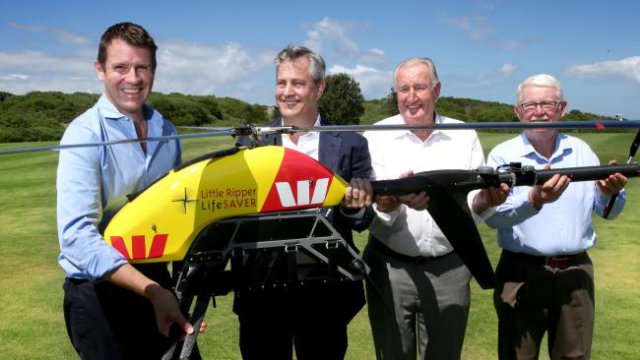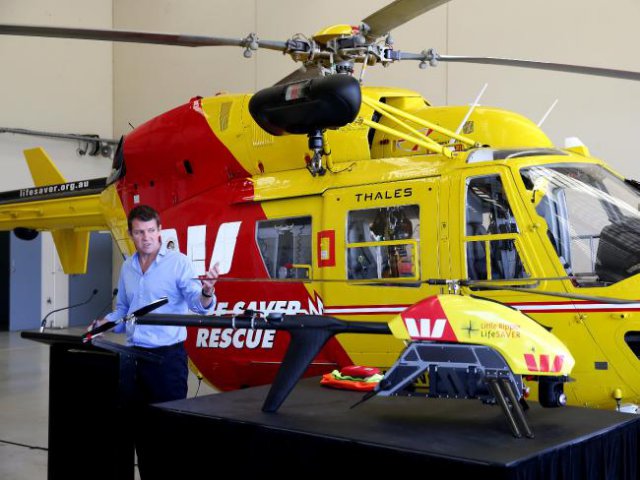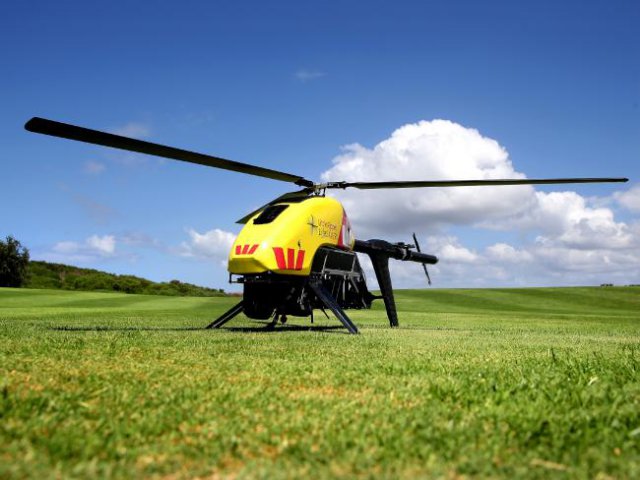High-Tech UAVs developed by Australia’s first astronaut and a philanthropist whose friend was killed by a shark are to patrol NSW’s coast, spotting great whites and other man-eaters.
The unmanned aerial vehicles, called ‘Little Rippers’ and worth $250,000 each, will begin a trial on the state’s shark-infested north coast within days after being unveiled by Westpac and Premier Mike Baird yesterday.

Premier Mike Baird with Westpac CEO Brian Hartzer, Kevin Weldon and Tony Haven and the Westpac “Little Ripper” drone Picture: Gregg Porteous
Kevin Weldon, founding president of the International Life Saving Federation, began developing the system 10 years ago after being inspired by US military drones, credited with saving 5000 lives after Hurricane Katrina.
He has a very personal interest. Mr Weldon, a philanthropist, the first publisher of the Macquarie dictionary and an aviation expert, was in the water when his friend was killed by a shark off Burleigh Heads, Queensland in 1954.
“He got kind of separated from the group and then boom, this shark just took him. It was very quick,” he said of the attack.
Sydney-born astronaut Dr Paul Scully-Power, who went into space as a payload expert on the 1984 shuttle Challenger, is also part of the team developing and trialling the Little Rippers, which are modified versions of US-built Vapor 55 unmanned aerial vehicles.
The military-grade, battery-powered drones, fitted with a front-mounted camera on a CM100 gimbal from local company UAV Vision, feeding live footage back to two controllers, can fly up to 100 kilometres and stay airborne for about 150 minutes, flying above beaches and the ocean to spot sharks.
Westpac CEO Brian Hartzer added: “Shark attacks have been a really emotive issue for Australians so to give people more safety and security around the beaches is very appealing.”
There were 14 shark attacks off NSW in 2015, including one fatality. There has been one attack so far in 2016.
University of Technology Sydney is developing software to analyse live footage from the drones to identify the types of sharks spotted. The information can then be relayed immediately to emergency services, beach lifeguards, and water users.
Sharks could also be detected at night using infra-red technology.

Premier Mike Baird launches the Westpac “Little Ripper” mini drone to hunt and spot sharks off the NSW coast. Picture Gregg Porteous
“Every now and then the future crashes in on today and I think this is one of those days,” said Premier Mike Baird.
An academy is likely to be set up to train licensed surf lifesaving volunteers to fly the drones.
Source: The Daily Telegraph Australia

